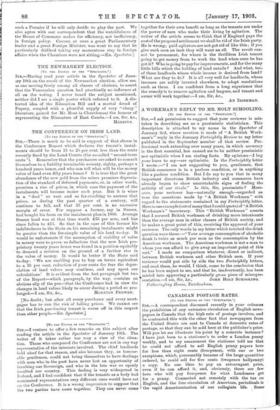[To THE EDITOR OF THE "SPECTATOR."] venture to offer a
few remarks on this subject after reading the article in the Spectator of January 10th. The writer of it takes rather too rosy a view of the situa- tion. Those who composed the Conference are not in any way representative of the interests involved. The chief landlords held aloof for that reason, and also because they, as honour- able gentlemen, could not bring themselves to have dealings with men who in the past have never lost an opportunity of insulting our Sovereign, and who in the late war so openly insulted our country. This feeling is very widespread in Ireland, and I feel confident that if the tenants as a body had nominated representatives very different ones would have sat on the Conference. It is a wrong impression to suppose that the two parties have come together. They can never come together for their own benefit as long as the tenants are under the power of men who make their living by agitation. The writer of the article seems to think that if England pays the cost of the proposed settlement we shall be rid of thelrish party. He is wrong; paid agitators are not got rid of like this ; if you give such men an inch they will want an ell. The result can- not be permanent, for where is the thriftless Irish tenant going to get money from to work the land when once be has got it? Who is going to pay for improvements, and for the many little bills which the holding of land entails ? And what, too, of those landlords whose whole income is derived from land? What are they to do ? It is all very well for landlords, whose incomes are safely invested elsewhere, to adopt resolutions such as these. I am confident from a long experience that the remedy is to remove agitation and leagues, and tenant and owner will work together.—I am, Sir, Sec.,
AN IRISHMAN.










































 Previous page
Previous page